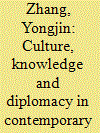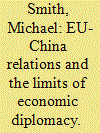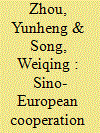|
|
|
Sort Order |
|
|
|
Items / Page
|
|
|
|
|
|
|
| Srl | Item |
| 1 |
ID:
129627


|
|
|
|
|
| Publication |
2014.
|
| Summary/Abstract |
The worlds that Matteo Ricci lived in-early modern Europe, Ming China and the pre-Westphalian international order-are vastly different from the world of the 21st century, when accelerated globalization binds China and Europe together as never before and when global international society is moving decisively beyond Westphalia. How much are the legacies of Matteo Ricci still relevant, 400 years on, to enriching the relationship between China and Europe in the 21st century? This paper starts with a brief overview of the civilizational encounters between China and Europe and the unfolding of their turbulent and often troubled relationship over the last four centuries of wars, collapse of empires, internal convulsions, nation-state building, scientific and industrial revolutions and great economic transformations. Against this historical narrative is the discussion of Matteo Ricci as a cultural agent, a knowledge broker and a practitioner of public diplomacy in fostering Sino-European relations in its nascent years. The paper argues that even in an increasingly globalized world, Matteo Ricci's conception of culture, his wisdom about the power of knowledge and his practice of people-to-people diplomacy remain valuable in informing both China and the EU, two aspiring global players, in their search for a viable China-EU strategic partnership.
|
|
|
|
|
|
|
|
|
|
|
|
|
|
|
|
| 2 |
ID:
129634


|
|
|
|
|
| Publication |
2014.
|
| Summary/Abstract |
This paper addresses a key problem in EU-China economic relations: the capacity of the EU to exert leverage through its economic diplomacy in the context of key economic trends, policy dilemmas, and processes of governance. The paper begins by identifying key elements of the EU's economic diplomacy and their relationship to key functions: deliberation, representation, communication, and negotiation. It continues by reviewing key trends and challenges in EU-China economic relations, in terms of trade, finance/investment, and broader issues of economic performance, with special reference to the problems emanating from the current economic turbulence both in the EU and in the broader global political economy. It then identifies a number of key policy dilemmas for the EU in areas such as trade defense/trade promotion, environment/development, security/commercial priorities, nvestment/sovereignty, and explores these in terms of three key concepts: orientation, coordination, and effectiveness. In pursuing this analysis, the paper relates these trends and dilemmas to attempts to govern EU-China economic relations: public/private, bilateral/multilateral, and regulatory/political. In the final section of the paper, these efforts are evaluated in the context of the EU's economic diplomacy, with relation to key actors, processes, and outcomes and to the key functions of deliberation, representation, communication, and negotiation.
|
|
|
|
|
|
|
|
|
|
|
|
|
|
|
|
| 3 |
ID:
157506


|
|
|
|
|
| Summary/Abstract |
Despite considerable differences in their level of social and economic development, China and Europe both face the challenges of energy insecurity and environmental degradation. Given their shared sustainable development objectives and the complementarity of their comparative advantages, the two have great potential for cooperation, which should provide both the motivation and capabilities to cooperate in relevant areas. However, there are a number of barriers and impediments at both the macro- and micro-levels. China and Europe should focus their joint efforts on several key areas of feasible renewable energy sector cooperation, including strengthening institutional links, facilitating bilateral investment and coordinating positions and actions in multilateral settings. Concrete cooperation in the renewable energy sector can cement the China-EU strategic partnership, thereby bringing benefits to both sides and beyond.
|
|
|
|
|
|
|
|
|
|
|
|
|
|
|
|
| 4 |
ID:
129630


|
|
|
|
|
| Publication |
2014.
|
| Summary/Abstract |
This article looks at matters of trust, of structures and of dialogue in the European Union (EU)-China relations. It argues that EU-China relations need resetting given the increasingly negative perceptions of China in Europe and given Chinese dissatisfaction with what it considers to be a degree of EU incoherence, incompetence and inconsistencies. Their 'strategic partnership' proclaimed in 2003 in many ways is rather empty and lacks much coordination of diplomacy. Their economic relationship while substantial is problematic and asymmetric in nature. However, restructuring the relationship through new dialogue mechanisms and agreements may resettle their relationship along more pragmatic functional grounds. In particular, the creation in 2012 of a third High Level Dialogue, at Track-2 rather than Track-1 level, that of People-to-People (PPD), may reduce the 'trust deficit' in the still longer term. Consequently, the article seeks to contextualize and evaluate the rhetoric and substance surrounding the various dialogue meetings and structures emerging in 2012. It also considers the progress, or perhaps lack of progress, on concluding a Partnership and Cooperation Agreement (PCA). It concludes that one way forward is to de-politicize the partnership.
|
|
|
|
|
|
|
|
|
|
|
|
|
|
|
|
|
|
|
|
|